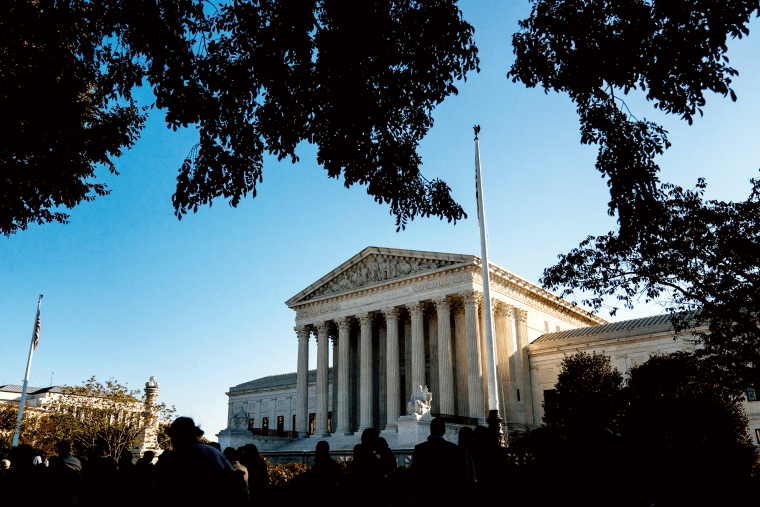WASHINGTON — The Supreme Court on Tuesday indicated it would rule in favor of a concrete company in Washington state seeking to revive a lawsuit it filed against the International Brotherhood of Teamsters alleging that a strike damaged its product.
The legal question is whether the company, Glacier Northwest Inc., can sue the union for damages in state court over an August 2017 strike action when drivers walked off the job, leaving wet concrete in their trucks.
Based on questions of the justices during the oral argument, it appears the court will say that the Washington Supreme Court was wrong to dismiss the lawsuit. It could however be a narrow ruling adopting the middle-ground position taken by the Biden administration.
That could mean that even though the lawsuit is revived, it could be put on hold until the National Labor Relations Board, which handles labor conflicts, finishes its own investigation into whether the strike action and the alleged damage was an activity protected by federal labor law.
During the argument, justices wrestled with the distinction between economic loss caused by a strike action, which is generally considered not to be the responsibility of workers, and intentional destruction of property, which would not be protected.
Chief Justice John Roberts used milk production as an example of harm caused by a strike, noting "the difference between the milk spoiling and killing the cow."
Darin Dalmat, a lawyer representing the union, conceded that there are limits to what conduct should be protected.
"We absolutely agree that you can't burn down the factory," he said.
Business interests that are often in conflict with organized labor have in the past been heavily critical of the labor board. The Supreme Court's conservative majority has ruled against unions on several occasions in recent years, including a 2018 case in which the court said public sector workers who choose not to join a union cannot be compelled to pay a share of union dues for covering the cost of negotiating contracts.
The case before the justices Tuesday comes when the number of strikes has increased amid a renewed interest in some sectors in the protections that union jobs can offer. It centers on an incident in which members of Teamsters Local 174 went on strike after negotiations broke down over a new collective bargaining agreement.
When truck drivers walked off the job, the company says some of the concrete already in the process of being delivered was rendered useless. Drivers returned trucks to the company’s facility, some of which had partial or full loads on board. As a result of the strike, concrete was left in the trucks and had to be removed to harden and then be broken up before it could be disposed of, the company says.
The union says when the workers returned the trucks, the cement was wet, and they left the drums on the trucks rotating, meaning it would not immediately congeal. It was the company’s decision to remove the concrete and then break it up once it hardened, the union says.
Glacier says it lost $100,000 as a result of failing to fulfill a contract on the day of the strike and also claims additional damages. The company says it was able to do the previously scheduled work the following week.
The Washington Supreme Court ruled for the union in December 2021, saying that any concrete loss was “incidental to a strike arguably protected by federal law.”
Justice Department lawyer Vivek Suri, arguing on behalf of the Biden administration, said that the concrete company's lawsuit should be allowed to go ahead in state court based on the fact that the strikers failed to take reasonable precautions. Both liberal and conservative justices seemed receptive to his argument.
Further complicating matters, the National Labor Relations Board issued a complaint after the state court ruling, charging the company with unfair labor practices and saying that the drivers’ actions were “arguably protected.”
Suri said the justices do not have to decide whether the board's actions mean that the state court case should be put on hold until it has completed its investigation.
Glacier is represented by Noel Francisco, who served as solicitor general during the Trump administration. He wrote in court papers that federal law does not protect "the intentional destruction of property" or "strike-related conduct that fails to include reasonable precautions to protect employer property, much less deliberately destroys it."
The company is backed by business and anti-union groups, including the U.S. Chamber of Commerce, which said in a brief that the state court's finding that intentional destruction of property could be deemed a protected activity conflicted with U.S. Supreme Court precedent.
Various labor groups and unions back the Teamsters. In one brief, the United Brotherhood of Carpenters and Joiners of America and the Service Employees International Union said the current process for evaluating whether labor disputes in state court are trumped by federal law, dating back to a 1959 Supreme Court ruling, "has served to protect the rights of labor employees to bargain collectively and to strike lawfully in seeking better pay, benefits, and working conditions."

